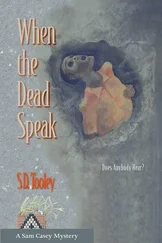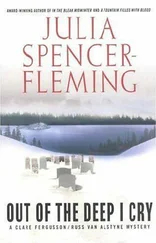So it was Karen who answered the front door to Detective Sergeant Malone and Detective Constable Parkin, took their wet coats from them and escorted them into the big shabby sitting room. She ran upstairs to get her mother, and once she was sure that a protesting Margaret Meadows was safely installed in the bathroom in order to apply her obligatory layers of make-up, Karen ran downstairs again to make DS Malone and DC Parkin tea while they waited.
Then when her mother finally surfaced, somewhat to Karen’s annoyance looking perfectly well-groomed and together and behaving quite charmingly, Karen was asked to leave the room. Karen didn’t think that was very fair, and therefore had no compunction whatsoever about putting her ear to the keyhole so that she could listen. It was not the first time Karen had put her ear to a keyhole in that house. Almost always she seemed to hear something she would rather not have heard. And yet again she was afraid of what she might learn. It didn’t stop her, though.
The woman detective constable seemed to do most of the talking. It was she who asked Margaret Meadows if she had looked after Lorraine and Janine Marshall around the time of Clara’s disappearance.
“Yes, I did,” replied Karen’s mother. “Richard came to me in a terrible state the night she left him. He said he didn’t know what to do. Begged me to take the girls until he sorted himself out.”
“And how long were they with you?”
“Not much more than a day really. It was a Sunday night when he brought them to me. I kept them until the Tuesday morning. Karen took them to school on the Monday...”
“Karen?”
“My daughter. She let you in.”
“But she’s only—”
Karen’s mother interrupted swiftly. There had been just a note of criticism in the policewoman’s voice. Karen recognized it at once. She was used to it, or something like it, almost every time her mother and father spoke to each other. And her mother was always quick to defend herself if she thought she was being criticized in any way.
“She’s thirteen. Almost fourteen. All right, she was only twelve then. But she’s always been very grown-up for her age. She’d already babysat for the Marshalls once or twice before... before Clara went away. In any case, I was having one of my bad spells...”
Karen remembered it well, remembered eating her breakfast that morning while listening to her parents rowing over the Marshall girls. Her mother had made a rare early-morning appearance in the kitchen, but she had been clad only in her dressing gown, had clearly had no intention of getting dressed, and had paid little attention to Janine or Lorraine who had sat white-faced and silent at the table. Lorraine had been tearful, but nobody took much notice, least of all Karen who had spent her childhood accepting family rows and disruptions as the norm, and merely assumed that the Marshall girls would do the same.
The girls’ primary school had been next door to her grammar school and as she had neared it with her young charges Karen remembered rounding on a still-snivelling Lorraine.
“Shut up or I’ll give you one,” she’d unsympathetically shouted at the little girl who had immediately shied away from her, lower lip trembling uncontrollably. At the time Karen couldn’t have cared less. She hadn’t wanted to be seen by any of her schoolfriends with wailing little ones in tow. Any curiosity she might have felt about the girls being so unceremoniously dumped at Laurel House, and certainly any compassion for their predicament, had been totally negated by the sheer irritation of having the unwanted responsibility for these two small children thrust upon her.
Karen pressed her ear closer to the keyhole. Her mother was still talking. “I did pick them up from school in the afternoon. And I really wasn’t well. The last thing I needed was two small children to look after, as well as Karen.”
Karen screwed up her face and thought hard. When had her mother ever looked after her, she wondered. Probably not at all really since she’d been a baby, and she had gathered that even then it had been her maternal grandmother, now dead, who had done most of the looking-after.
“But that’s what neighbours are for, isn’t it?” Margaret Meadows continued. She paused then, as if waiting for a reply. When none came she started to speak again.
“Then early on the Tuesday Richard came round and took them back. He said his mother was on her way from Bournemouth, that she was going to look after Lorraine and Janine until either Clara turned up again or he could make some permanent arrangement to look after them himself.”
The detective constable’s voice was edgy when she eventually spoke again.
“So did Clara turn up again?”
“Yes.” Margaret Meadows paused once more. “Well, he said she did. Months afterwards I asked him if the girls were still with his mother. He said Clara had come back for them.”
“Did you see her?”
“No.”
“So did you believe him?”
“Yes, of course.” The meaning of the words was clear enough, but Karen could detect the note of uncertainty in her mother’s voice. “Well, yes, I did. But I know other people didn’t. And nobody’s ever seen her since, have they? I thought that was what all this was about?”
The last sentence was also a query.
“Indeed it is, Mrs. Meadows, indeed it is,” replied DC Parkin. “Did you ever meet Richard Marshall’s mother, by the way?”
“No.” Margaret Meadows sounded puzzled, as if she hadn’t thought about that before. “No, I didn’t. I don’t know if anyone did...”
Her voice tailed away. She seemed to be trying to think things through and didn’t like the route along which her thoughts were taking her.
DC Parkin and DS Malone left soon afterwards. Margaret Meadows remained in the sitting room. She was not given to observing life’s social niceties if it didn’t suit her. Karen beat a fast retreat to the top of the stairs allowing the two police officers to let themselves out of the house.
Afterwards she sat on the stairs, nearly at the top where they turned at right angles into the landing. Her mother did not know it, but she had been crouched in exactly the same position — curled up, hugging her legs to her chest — and exactly the same spot on that June Sunday evening the previous year when Richard Marshall had brought his little girls round. In bed earlier than usual because of a bad cold, Karen had been lying uncomfortably awake, sniffing, sneezing and coughing away, when she had heard the doorbell, followed by a voice. At first she wasn’t sure who had arrived, but she made herself concentrate and then realized that this was the voice of their nearest neighbour. She was familiar enough with his voice, and with him too, although hardly at all with his wife who always seemed to be rather overshadowed by her much larger husband. Richard Marshall was a big noisy man who always had plenty to say for himself if you met him in the street or at the shops, but Karen had never heard him sound like this before, so low and urgent. She had somehow known at once that this was no ordinary visit. Indeed, apart from one fateful afternoon, she had never seen Richard Marshall at Laurel House before. And so, her curiosity aroused, she had crept her way from her bedroom along the landing to the staircase in order to find out what was going on. Karen had done a lot of that sort of thing as a child. It was the only way she ever got to find out anything, because nobody ever told her.
From her vantage point she had peered down at the little scene being enacted below. The hall at Laurel House was badly lit and both Richard and her mother were standing in such a way that Karen couldn’t see their faces. Janine and Lorraine were each holding one of their father’s hands. One of them was crying, but Karen was not sure which. She could not see their faces either.
Читать дальше












